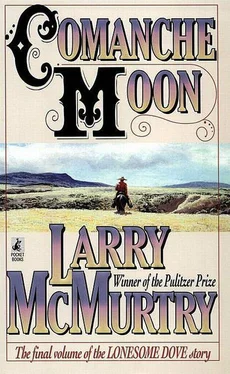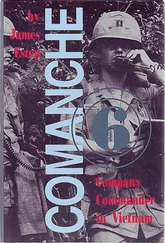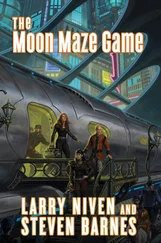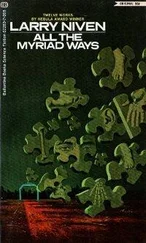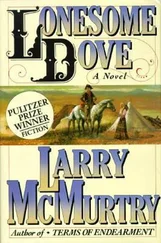"Woodrow, you're correct--Jake's been bunking with Maggie for a while," Augustus said, keeping his tone mild.
It was the news Call had feared; yet Augustus delivered it as matter-of-factly as if he were merely announcing that he needed a new pair of boots. They were standing by the corrals in bright sunlight, watching Pea Eye try to rope a young gelding, a strawberry roan. The boy Newt watched from a perch atop the fence.
Pea Eye caught the gelding on the third throw and dug in his heels as the young horse began to fight the rope.
"Pea's getting trained up to a point where he can almost rope," Gus said. "I can remember when it took him thirty throws to catch his horse." Call was silent. He wasn't interested in how many throws it took Pea Eye to catch a horse, nor was he interested in the six young horses the rangers had just purchased from a horse trader near Waco, though he had approved the purchase himself and signed the check.
Normally the arrival of six new horses, acquired at no small cost, would have occupied him immediately--but what occupied him then was Augustus's acknowledgment that Jake was living with Maggie Tilton and her son, Newt--or, if not fully living with her, at least bunking with her to the extent that suited his pleasure and hers.
Augustus saw that his friend was stumped, if not stunned, by the discovery of a situation that had been no secret to most of the rangers for well over a year. It was a peculiar oversight on Woodrow's part, not to notice such things, but then Woodrow Call always had been able to overlook almost everything in life not connected with the work of being a Texas Ranger.
"If you knew about this why didn't you tell me?" Call asked.
Augustus found himself finally having the conversation he had been dreading for a year. He had long known that Woodrow was more attached to Maggie Tilton than he allowed himself to admit. He wouldn't marry her or claim as a son the nice little boy sitting on the fence of the corral; but neither of those evasions meant that Woodrow Call wasn't mighty fond of Maggie Tilton--even though he knew that Call had stopped visiting her as a lover about the time Newt was born. Call had known Maggie longer than he himself had known Clara Allen. It was a long stretch of time, during which Woodrow had displayed no interest, serious or trivial, in any other woman.
Augustus knew, too, that the fact that Woodrow was awkward about his feelings didn't mean that his feelings were light--Maggie Tilton, he felt sure, knew this as well as anyone.
Evidence that Woodrow Call harbored no light feeling for Maggie was right before him: Call looked blank and sad, not unlike the way survivors looked after an Indian raid or a shoot-out of some kind.
"I suppose I am a fool," Call said.
"I would never have expected her to accept Jake Spoon." "Why?" Gus asked. "Jake ain't a bad fellow, which ain't to say that he's George Washington, or a fine hero like me." "He's lazy and will shirk what he can shirk," Call replied. "I will admit that he writes a nice hand." "Well, that's it, Woodrow--t's accurate," Augustus said. "Jake's just a middling fellow. He ain't really a coward, though he don't seek fights. He's lazy and he'll whore, and I expect he cheats a little at cards when he thinks he can get away with it.
But he helps ladies with their groceries and is handy at gardening and will even paint a lady's house for her if the lady is pretty enough." "Maggie's pretty enough," Call replied.
"She is, yes," Augustus said. "I will have to say I ain't noticed Jake doing too many favors for the ugly gals." "Damn it, he's taken advantage of her!" Call said. He could think of no other explanation for the situation.
"No, I don't think he has," Gus said.
"I think Jake's been about as good to Maggie as he's able to be." "Why would you say that?" Call asked--of course it was like Augustus to take the most irritating position possible.
"I say it because it's true," Gus said.
"He's been a damn sight more helpful to her than you've ever been." There was a silence between the two men. Neither looked at one another for a bit--both pretended they were watching Pea Eye, who had managed to get the gelding snubbed to the heavy post in the center of the corral.
Call started to make a hot reply, but choked it off. He knew he wasn't really much help to Maggie--z his duties as a ranger captain had increased, he had less and less time to devote to the common chores that Maggie, like everyone else, might need help with. He didn't carry her groceries or help her with her gardening; the fact was, rangering or no rangering, he had never felt comfortable doing things with Maggie in public. If they met in the street he spoke and tipped his hat, but he rarely strolled with her or walked her home. It was not his way. If Jake or Gus or any decent fellow wanted to do otherwise, that was fine with him.
But what Jake was doing now--or seemed to be doing--went well beyond giving Maggie a hand with her groceries or her garden. It bothered him, but he was getting no sympathy from Augustus; what he was getting, instead, was criticism.
"I have no doubt you think I'm in the wrong," Call said. "You always do, unless it's just rangering that's involved." "You're always fussing at me about my whoring and drinking," Augustus reminded him. "I suppose I have a right to fuss at you when the matter is crystal clear." "It may be crystal clear to you, but it's damn murky to me," Call said.
Augustus shrugged. He nodded toward Newt, who still sat on the fence, absorbed by the struggle between Pea Eye and the gelding. The boy loved horses. The rangers took him riding, when they could, and there was talk about finding him a pony or at least a small gentle horse.
"That boy sitting there is yours as sure as sunlight, but you won't claim him or give him your name and you've been small help with his raising," Augustus pointed out. "Pea Eye's more of a pa to him than you've been, and so am I and so is Jake. Maggie would like to be married to you, but she ain't. The only thing I don't understand about it is why she tolerates you at all. A man who won't claim his child wouldn't be sitting in my parlor much, if I was a gal." Call turned and walked off. He didn't need any more conversation about the boy; in particular he was sick of hearing how much the boy resembled him. The business about the resemblances annoyed him intensely: the boy just looked like a boy.
Discussing such matters with Augustus was clearly a waste of time. Augustus had held to his own view for years, and was not likely to change it.
He heard the whirl of a grindstone behind the little shed where the rangers did most of their harness repair and handiwork. Deets was there, sharpening an axe and a couple of spades. The cockleburs were bad in the river bottom where the horses watered --Deets sharpened the spades so he could spade them down and spare the rangers the tedious labor of pulling cockleburs out of their horses' tails, an annoyance that put them all out of temper.
"Deets, would you go get Newt and walk him to his mother?" Call asked. "It's a hot day, and he won't stay in the shade. He'll get too hot if he just sits there in the sun." "That boy need a hat," Deets observed.
The grindstone was the kind that operated with a pedal, but the pedal had a tendency to stick. He had a cramp in his calf from working the old sticking pedal most of the day; but he had an impressive pile of well-sharpened tools to show for his effort: four axes, seven hatchets, an adze, five spades, and a double-bladed pickaxe. Walking a little with Newt would be a nice relief. Captain Call had promised to get him a better grindstone at some point, but so far the money for it hadn't been made available. Captain Augstus said it was the legislature's fault.
"That legislature, it's slow," Augustus often said.
Читать дальше
